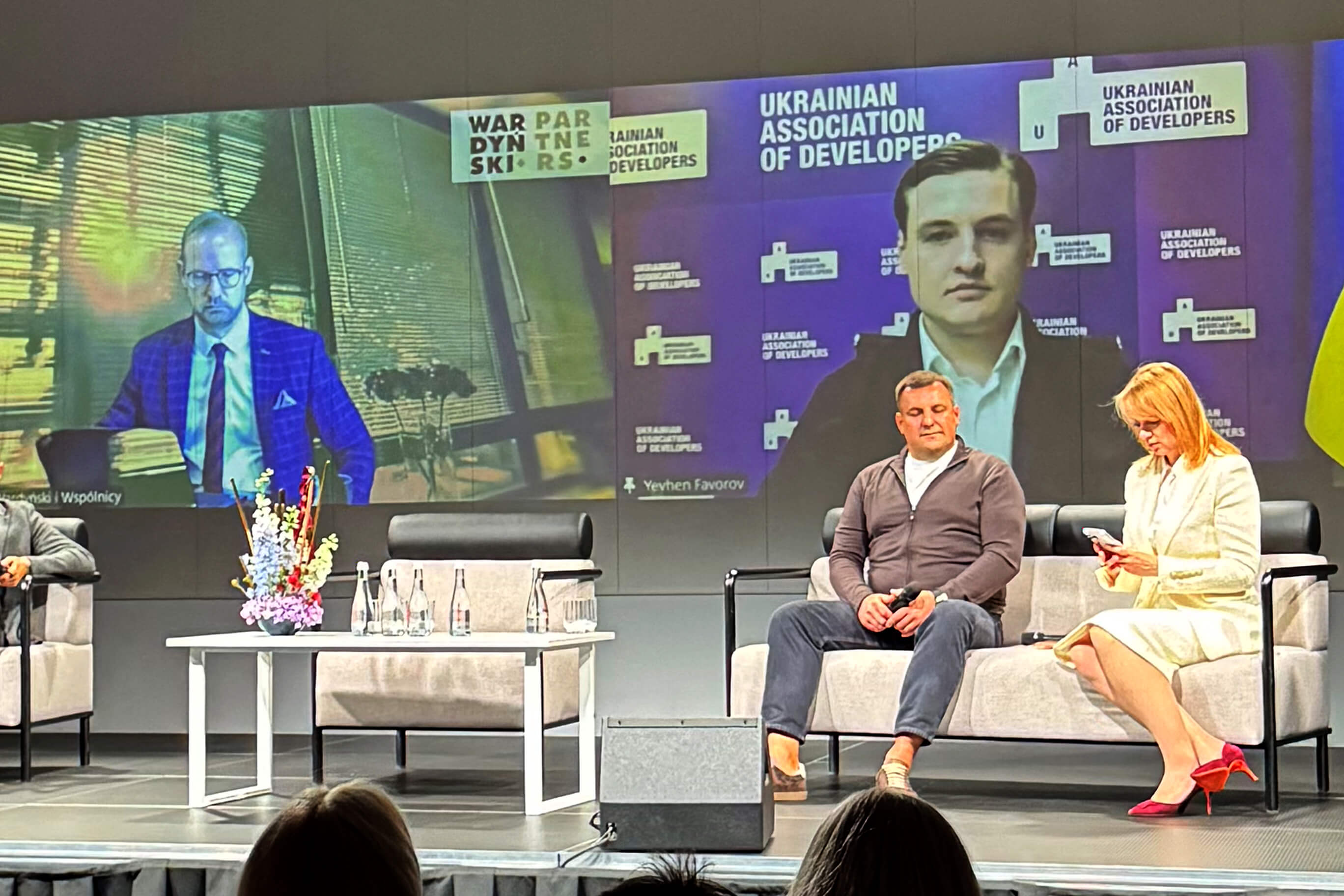Polish experience of development regulation: lessons for Ukraine
The Ukrainian Association of Developers has launched a project to exchange experience with industry associations in other EU countries. Colleagues from the Polish real estate development market shared their current practices at a discussion panel during Lviv Build Forum. In two decades, Poland has managed to build a stable housing market and develop mortgage lending to more than 20% of GDP (compared to less than 1% in Ukraine).

Poland, like Ukraine, has had a difficult path in the construction sector. In the early 2000s, they faced the same problems as we do today: lengthy approvals, complicated development plans, chaos in decision-making, and a lack of guarantees for banks and buyers. Without this, no mortgage could work. But gradually, the country has undergone reforms through a dialog between the government, developers, and society. The changes began with the reform of the licensing system and legislative guarantees for investors. Today, the residential real estate market in Poland is in good condition: the country has clearly defined terms for issuing permits, control mechanisms, restrictions on appeals, and clear rules for mortgage financing.

Michał Glinski, Polish expert and managing partner of Wardyński & Partners, shared two solutions that have significantly improved the conditions in the developer market, thereby reducing risks for developers and banks:
"First, we have set a clear timeframe for issuing permits for construction. As of today, they are 65 days. For each day of delay, a fine of 120 euros per day is imposed on a civil servant.
Second, we have implemented the lawaccording to which the decision to grant a permit to a developer can be appealed only within 5 years. Because in the past we also dealt with similar problems. Sometimes a building was built and put into operation, and 10-15 years later someone challenged the building permit. This poses a huge problem for both the residents of this building and the developer. That's why we came to the conclusion that 5 years is enough."
Such guarantees provided banks with predictability and developers with the opportunity to plan long-term projects. This has become the foundation for the growth of the Polish mortgage market, where more than 80% of housing is now purchased with loans.
Escrow accounts as a condition for lending
Another important step is the mandatory use of escrow accounts, where buyers' funds are kept in secure accounts and become available to the developer only after certain stages of construction are completed. Since July 2024, such accounts have been mandatory for all Polish developers. This has increased the trust of banks and buyers, a key factor without which mass mortgages are impossible.
"We need to create a risk-free environment for developers. In conditions when you can have your permit, land right or conditions canceled, no bank will give you money. We need conditions like in Poland, when no document can be canceled after 5 years. That is, it is necessary to a) eliminate risks and b) create conditions for "long money," subsidize mortgages for people and lending for developers so that they can get loans and build affordable housing. We are not talking about the premium segment, but if we want to provide people with quality housing, the state must create these conditions," explains Yevhen Favorov, head of the Ukrainian Association of Developers.
Ukrainian risks: litigation and uncertainty
The Ukrainian real estate market is slowing down due to the lack of clear rules and interaction between developers and the state. According to Yevhen Favorov, chairman of the Ukrainian Association of Developers, market participants face the risk of having their construction permits revoked even after the building is put into operation. More than 200 lawsuits that have taken place in recent years were analyzed. The decision to cancel was made in only 11 cases (about 5%), and each case lasts an average of 16 months, which is almost a full construction cycle. Such risks directly affect the amount of mortgage lending in the market.
"We often turn to the authorities with a simple request: to set a clear deadline after which a building permit cannot be canceled, either in court or administratively. This already works in Poland. And we are not asking for anything new - just to adopt what really works," explains Yevhen.
It is the lack of such guarantees that makes the Ukrainian market unpredictable and hinders the launch of large-scale mortgage programs.
Business cooperation with the government
The stability of the Polish housing market is the result not only of the laws passed, but also of cooperation between all market participants. Developers' associations actively cooperate with local authorities, the government, and the parliament to receive regular data and discuss what needs to be changed. This allows them to respond quickly to challenges and avoid misunderstandings.
.jpeg)
According to Rostyslav Melnyk, CEO of RIEL, the main problem of the Ukrainian real estate market is the legislative collapse. He also points out the importance of uniting all market players: the state, developers, local governments, etc.
"Today we buy land, factories, real estate, and we can't do anything about it because there is a collapse of legislation: one thing allows it, the other prohibits it. The market needs to be managed. It should not be "controlled" but understandable for everyone. In order to do this, we must all be together, united in large groups, and have real representation in cooperation with the authorities," Rostyslav explains.
Conclusions for Ukraine
Poland's experience proves that the stability of the mortgage market is not so much a consequence of cheap loans as of systemic changes in construction legislation. Clear deadlines, clear rules of the game, and secure financing mechanisms are what build trust between banks, developers, and buyers.
.jpeg)
The Ukrainian market is only at the beginning of this journey. The initiative of the Ukrainian Association of Developers to study European experience is the first step towards making mortgages affordable for hundreds of thousands of Ukrainians. The goal of cooperation with EU industry associations is to adopt the best time-tested practices and, in the long run, to propose methodological improvements to the legislation of the Ukrainian real estate market and thus bring our market closer to European standards.




